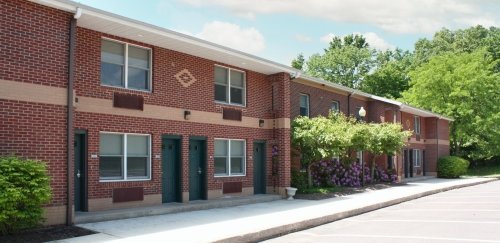
Montgomery Place Apartments
Montgomery Place Apartments, located on upper campus, provides living accommodations for 192 students. Opened in August of 1989 and costing $5.5 million dollars, the two-bedroom/two-person apartments are clustered in six buildings, each named in honor of distinguished alumni:
- Charles H. Albert, Class of 1879
- Edwin M. Barton, Class of 1907
- Fred W. Diehl, Class of 1909
- Nevin T. Englehart, Class of 1905
- Susie Rayos Marmon, Class of 1906
- Annice E. Taylor Marshall, Class of 1901
Coed living optional within each apartment upon approval from the Office of Residence Life.
Overview and Amenities
| Access Control | Card-operated building and room access |
|---|---|
| Laundry | Facilities located at the end of each block of apartments |
| Internet | High-speed University wireless (WiFi) network |
| Television | One connection in living room (cable splitters allowed) 50" LCD television provided in living room |
| Furniture | Bedrooms include - Bed - Closet (x2) - Desk with chair Apartments include - Table with 4 chairs - Arm chair (x2) - End table - Couch - Media stand |
| Appliances | Apartments include - Refrigerator - Range |
| Room Dimensions* | 10' 10" x 13' 10" (≅ 150 ft2) |
| Carpet Size | N/A; Bedroom is carpeted |
| Mattress Size | 80" L x 36" W x 7" H Twin or Twin XL sheets suggested |
| Bed Height | 24" |
| Closet Size | 78" H x 36" W x 23" D |
| Air Conditioning | Yes |
| Elevator | No |
| Dedicated Parking | Yes |
| Meal Plan | Optional |
| Miscellaneous | Electric utilities** Campus shuttle service |
*Approximate dimensions; rooms may vary
**The utility fee is a one time per semester fee that appears on your university bill
Gallery
About the Montgomery Place Apartments
Additional Resources
Contact
-
Jessica Kozloff Apartments Community Building
- 570-389-4989
- Send an Email
Graduate Hall Director
Makaylia Ray
-
Jessica Kozloff Apartments Community Building
- 570-389-2962








